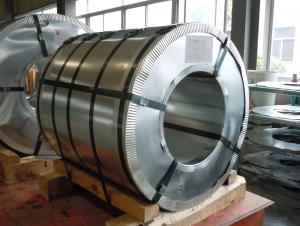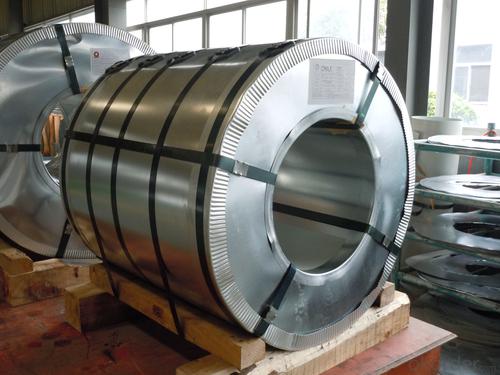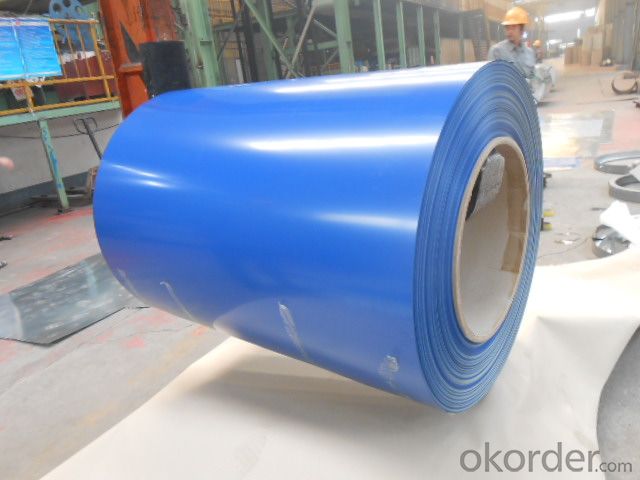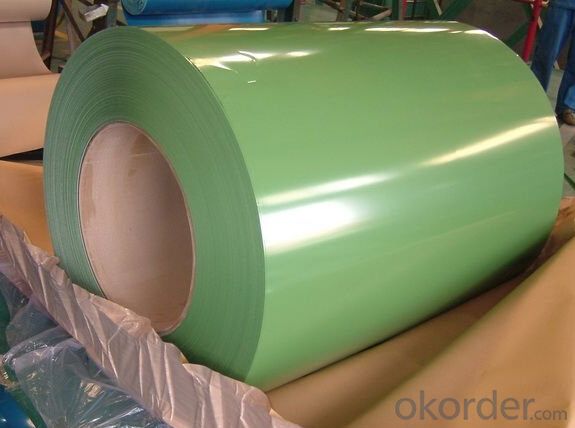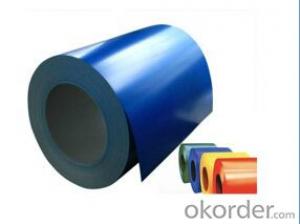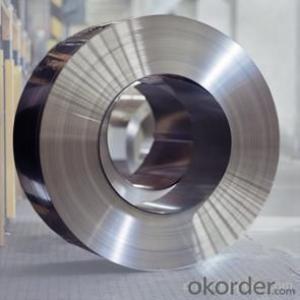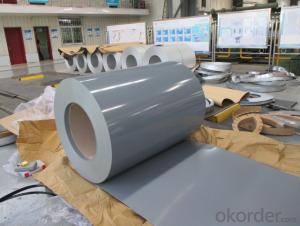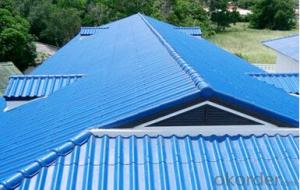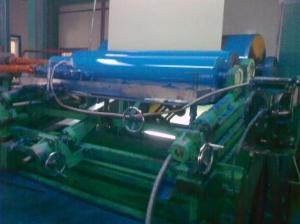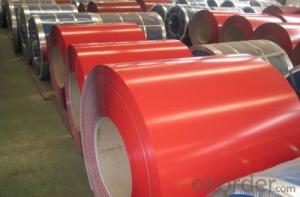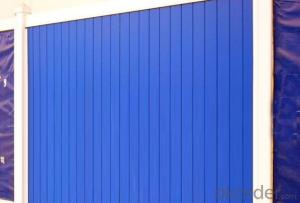PPGI 0.16-0.6mm 700-1250mm various color/10 year's experience /SGS
- Loading Port:
- Tianjin
- Payment Terms:
- TT OR LC
- Min Order Qty:
- 25 m.t.
- Supply Capability:
- 10000 m.t./month
OKorder Service Pledge
OKorder Financial Service
You Might Also Like
Specifications of Prepainted Galvanized SteelCoil:
1) Capacity: about 15,000 tons per month for coil product
2) Standard: JIS G3302, JIS G3312, ASTM A653M/A924M 1998
3) Grade: Q195-Q235 and SPCC, SPCD, SPCE, SGCC (DX51D+Z) SGCD (DX52D+Z), etc.
4) Thickness: 0.23mm-2.0mm
5) Zinc coating weight: 60-275g/m2
6) Width: 600mm-1200mm, or according to the customer's request.
7) Coil ID: 508mm-610mm
8) Coil Weight: according to the customer's request
9) Color: RAL, or other series
10) Surface protection: PE, PVDF, SMP, HDP, etc.
11) Surface treatment: chromate, oil/unoil, bright finish, spangle, anti-finger print
12) Min trial order: 25 ton each size, 1x20' per delivery
| Thickness | Width | Coil ID | Zinc Coating |
| 0.2mm-2.0mm | 600mm-1250mm | 508mm/610mm | 60g/m2-275g/m2 |
Advantages of Our Prepainted Galvanized SteelCoil:
1) Excellent corrosion resistance: The zinc layer provides a good protection of Pre-painted Galvanizeed Steel Sheet.
2) High heat resistance: The reflective surface of the material aids in efficiently reflecting the sunlight away and in turn reducing the amount of heat transmitted. The thermal reflectivity converts into energy savings.
3) Aesthetics: Pre-Painted Galvanized steel sheet is available in plethora of patterns and multiple sizes as per the requirements that given by our customers.
4) Versatility: can be used in the various areas.
Applications of Prepainted Galvanized SteelCoil:
1) Buildings and constructions: roofing, ceilings, gutters, venting lines, indoor decorations, window frames, etc.
2) Electrical appliances: computer shells, washing machines, refrigerators, dehumidifiers, video recorders, water heaters, etc.
3) Agricultural equipments: troughs, feeding tools, agricultural driers, irrigation channels, etc.
4) Vehicle parts: back-seat plates of buses and trucks, conveying systems, oil tanks, etc.
Coating Chief Feature
| Project | Pencil hardness | Reverse impact | T bending | Cupping test | MEK cleaning |
| Front/back | ≥ H/2H | ≥ 9J/6J | ≤ 3T/5T | ≥ 6mm/4mm | ≥ 100time/50time |
Structure of GI/PPGI
| Item | Thickness | Type | Feature |
| Laminated film | 50μm | Polyethylene | Protecting from scratchs and contamination (option) |
| Top coat | 20μm | Polyester Fluorine | Chemical resistance and formability |
Primer coat | 5μm | Polyester | Workability, corrosion resistance and adhesion to the primer coating |
| Chemical treatment | 1μm | Chromate | Good adhesion and corrosion resistance |
| Substrate | 0.2mm-1.2mm | GI.GL,AL | GI.GL,AL |
| Back coat |
5±2μm |
Epoxy | Corrosion resistance and adhesion to the substrate |
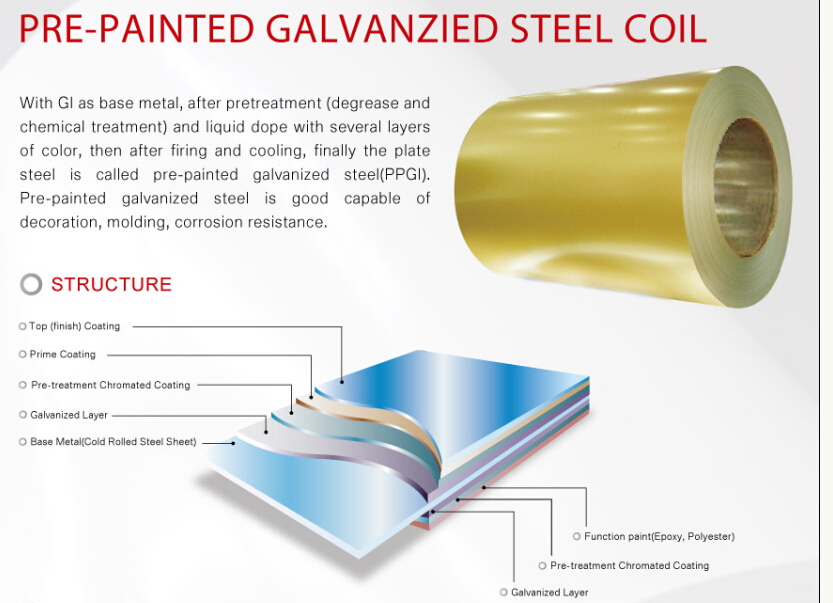
- Q: What are the common applications of stainless steel coils?
- Stainless steel coils have a wide range of applications due to their unique properties and characteristics. Some of the most common applications of stainless steel coils include: 1. Automotive industry: Stainless steel coils are widely used in the automotive industry for various components such as exhaust systems, mufflers, and catalytic converters. The corrosion resistance and durability of stainless steel make it an ideal choice for these applications. 2. Construction industry: Stainless steel coils are extensively used in the construction industry for structural elements, roofing, cladding, and facades. Its high strength, resistance to corrosion, and aesthetic appeal make stainless steel a popular choice for architectural projects. 3. Kitchen appliances: Stainless steel coils are commonly used in the manufacturing of kitchen appliances such as refrigerators, stoves, ovens, and dishwashers. The easy cleanability, resistance to heat and stains, and hygienic properties of stainless steel make it a preferred material for these applications. 4. Food processing industry: Stainless steel coils are widely used in the food processing industry for equipment such as tanks, pipes, and conveyor systems. The corrosion resistance and easy cleanability of stainless steel ensure the integrity and hygiene of food products. 5. Medical industry: Stainless steel coils find extensive use in the medical industry for various applications such as medical devices, surgical instruments, and implants. The biocompatibility, strength, and resistance to corrosion make stainless steel an ideal material for these critical healthcare applications. 6. Energy sector: Stainless steel coils are used in the energy sector for applications such as heat exchangers, boilers, and pipelines. The high-temperature resistance, excellent mechanical properties, and corrosion resistance of stainless steel make it suitable for these demanding applications. 7. Chemical industry: Stainless steel coils are employed in the chemical industry for storage tanks, piping systems, and reactors. The corrosion resistance and ability to withstand high temperatures and aggressive chemicals make stainless steel coils a reliable choice for handling various chemical substances. 8. Manufacturing industry: Stainless steel coils are used in a wide range of manufacturing processes such as stamping, forming, and fabrication. The versatility, durability, and ease of machining of stainless steel make it a popular choice for various industrial applications. Overall, the common applications of stainless steel coils are vast and varied, thanks to their exceptional properties like corrosion resistance, strength, durability, and aesthetic appeal.
- Q: How are steel coils used in the manufacturing of agricultural sprayers?
- Steel coils are used in the manufacturing of agricultural sprayers as they are shaped and formed into the structure of the sprayer, providing strength, durability, and stability. The coils are often used as the main frame or structural components of the sprayers, ensuring that they can withstand the harsh conditions and heavy loads involved in agricultural applications.
- Q: How are steel coils used in the manufacturing of fasteners?
- Steel coils are used in the manufacturing of fasteners by being processed and shaped into various forms, such as screws, bolts, and nails. The coils are fed into machines that cut, shape, and thread the steel to create the desired fastener. This process allows for efficient mass production and ensures the strength and durability of the fasteners.
- Q: Please people suggest me how can I select external finishing for Steel Building as there is a wide range of choice available.
- Nowadays, okorder /
- Q: What are the dimensions of steel coils used in the electrical equipment industry?
- The dimensions of steel coils used in the electrical equipment industry can vary depending on the specific application and requirements of the equipment being manufactured. However, there are some common dimensions that are frequently used in this industry. Typically, the width of steel coils used in electrical equipment manufacturing ranges from 0.5 inches to 72 inches (1.27 cm to 182.88 cm). The thickness of these coils can vary from as thin as 0.005 inches (0.0127 cm) to as thick as 0.25 inches (0.635 cm). The length of steel coils used in the electrical equipment industry can also vary, but it is often determined by the manufacturing process and the specific equipment being produced. Coils can range from a few feet to several hundred feet in length. Furthermore, the weight of steel coils can vary depending on their dimensions and the type of steel being used. For instance, a common weight range for steel coils used in the electrical equipment industry is between 5,000 pounds (2,268 kg) and 50,000 pounds (22,680 kg). It is important to note that these dimensions are not fixed and can vary based on the specific needs of the electrical equipment industry. Manufacturers may have their own unique specifications and requirements for the steel coils they use in their products.
- Q: How are steel coils measured for thickness?
- Steel coils are measured for thickness using a variety of methods. One common method is using a micrometer, which is a precision measuring instrument that accurately determines the thickness of the coil. The micrometer is gently pressed against the surface of the coil and the measurement is taken. Another method involves using a thickness gauge, which is a handheld device that can quickly and accurately measure the thickness of the steel coil. The gauge is placed on the coil's surface and the thickness is displayed on a digital screen. In some cases, ultrasonic thickness testing is used to measure the thickness of steel coils. This method involves using ultrasonic waves that are emitted from a handheld device. The waves travel through the coil and bounce back to the device, providing an accurate measurement of the thickness. Regardless of the method used, it is important to ensure that the measurements are taken at multiple points across the coil to account for any variations in thickness. This ensures that accurate and reliable measurements are obtained.
- Q: How are steel coils used in the production of metal facades?
- The production of metal facades relies on steel coils as a vital element. These coils, typically crafted from high-quality steel, serve as the raw material for manufacturing different components of metal facades, including panels, cladding, and roofing sheets. During the production process, the steel coils go through a series of procedures. Initially, the coils are uncoiled and flattened to achieve a smooth and uniformly thick surface, ensuring the desired texture for the metal facades. Subsequently, the flattened coils are cut into specific lengths and widths, tailored to meet the design requirements of the facades. After the cutting process, the steel sheets undergo various surface treatment techniques, such as cleaning, pickling, and coating. These treatments are crucial in enhancing the durability and corrosion resistance of the metal facades. The coatings are applied using different methods, such as galvanization, powder coating, or painting, depending on the desired finish and level of protection needed. Once the surface treatment is completed, the steel sheets are shaped and formed into the desired profiles for the metal facades. This can involve processes like roll forming, bending, or stamping, depending on the complexity of the design. These shaping processes give the metal facades their distinct appearance and structural integrity. Finally, the formed steel sheets are assembled and installed onto the building structure to create the metal facade. The installation techniques employed include welding, riveting, or adhesive bonding, depending on the specific project requirements. Thus, the steel coils play a critical role in providing the necessary raw material for the production of metal facades. These facades not only enhance the aesthetic appeal of buildings but also provide protection and durability against harsh weather conditions. To summarize, steel coils are indispensable in the production of metal facades as they serve as the raw material for various components. They undergo surface treatments to enhance durability, are shaped into desired profiles, and finally, installed to create the metal facade.
- Q: Cooling bed generally a part of the steel rolling mills
- Another type of cooling bed is used for square stock. It consists of several beams with angles cut upward from the bottom. The beams move in alternating fashion so that the square beam is lifted and sat into the next 'tooth'. The angle is cut so that the beam rotates as it is set down. This keeps the stock straight while it cools.
- Q: What are the common coil slitting equipment used in the industry?
- The common coil slitting equipment used in the industry include slitter rewinders, rotary shear slitters, and loop slitting machines. These machines are designed to efficiently cut and rewind large coils of material into smaller, narrower coils for various industrial applications.
- Q: So...I'm learning about how steel is made and I'm wondering if there is a more environmentally friendy method. I view it as unfriendly b/c of the oxygen that is injected when the steel is in the blast furnace or electric arc furnace. This oxygen bonds w/ the carbon to produce CO and CO2. THis is necessary to reduce the amount of carbon content to produce harder steels. So what other methods are there that can be used w/o having to end up w/ co and co2? thanks
- From what I understand of it, US steel is better as the steel is more recycled than Canadian, so a lot of that oxygen / CO2 has already taken place compared to working from ore. The second reason US steel is environmentally ahead of Canadian is that US tends to use Electric Arc, while Canadian uses Basic Oxygen, Basic Oxygen uses more energy than electric arc, and I think it also uses more oxygen, but I would suspect that oxygen that it uses is 'waste oxygen' and not converted into Co2 because the Co2 process is limited by the carbon, and steel only has so much carbon.
Send your message to us
PPGI 0.16-0.6mm 700-1250mm various color/10 year's experience /SGS
- Loading Port:
- Tianjin
- Payment Terms:
- TT OR LC
- Min Order Qty:
- 25 m.t.
- Supply Capability:
- 10000 m.t./month
OKorder Service Pledge
OKorder Financial Service
Similar products
Hot products
Hot Searches
Related keywords
